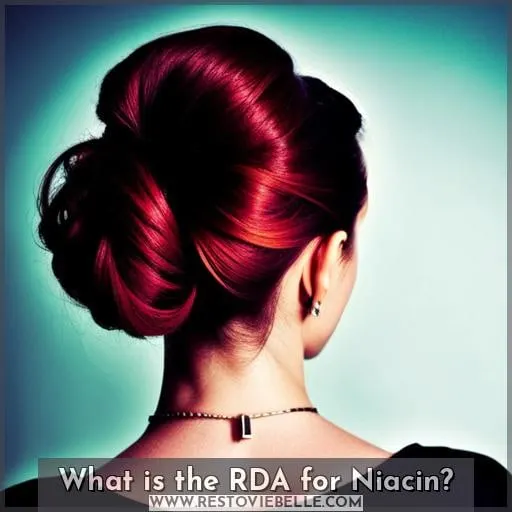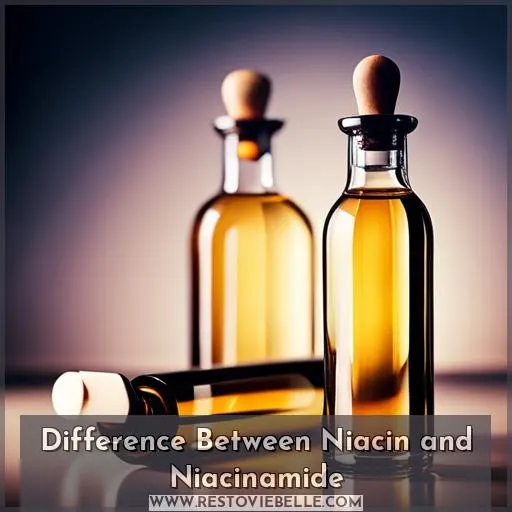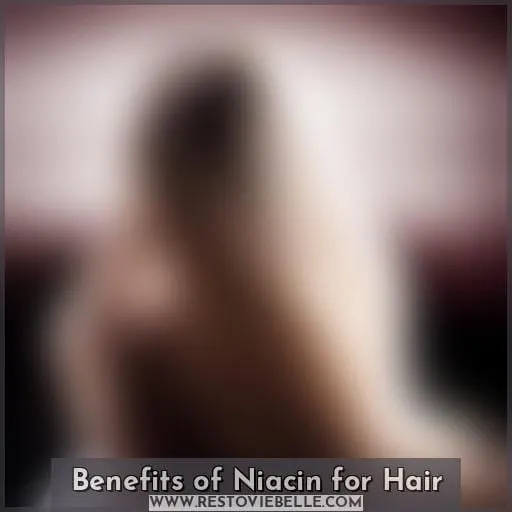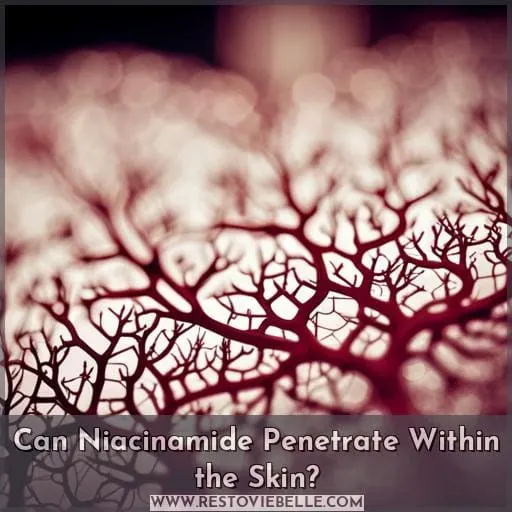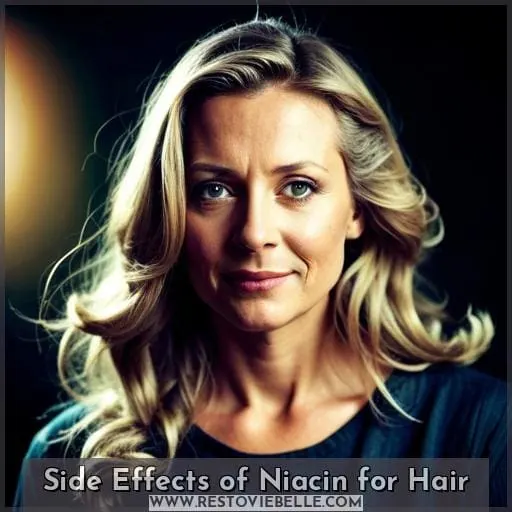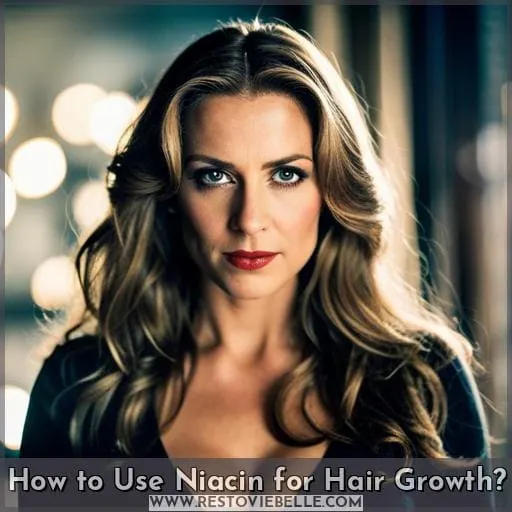This site is supported by our readers. We may earn a commission, at no cost to you, if you purchase through links.
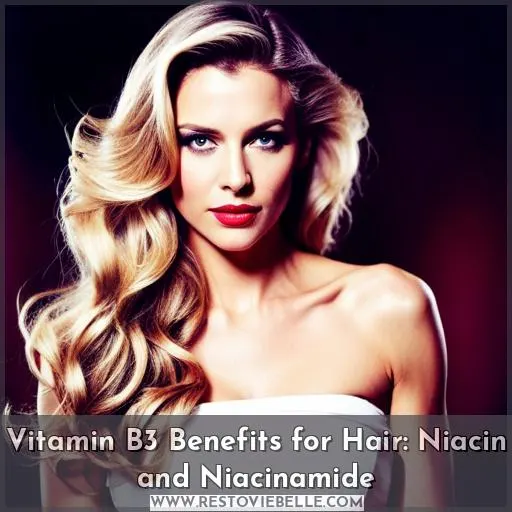
But what are the benefits of vitamin B3 for hair specifically? Let’s take a closer look at how this powerful vitamin can help give your scalp the nourishment it needs for strong, beautiful locks.
As well as promoting new growth and strengthening structures within each strand itself – such as providing UV protection against oxidative damage – there are many other ways that taking advantage of these benefits can transform your tresses from lackluster to luscious!
Table Of Contents
- Key Takeaways
- What is Niacin (Vitamin B3)?
- Foods Rich in Vitamin B3
- What is the RDA for Niacin?
- Difference Between Niacin and Niacinamide
- Benefits of Niacin for Hair
- Can Niacinamide Penetrate Within the Skin?
- What Are the Risks of a Vitamin B3 Deficiency?
- Side Effects of Niacin for Hair
- How to Use Niacin for Hair Growth?
- The Ayurvedic Spice Rich in Niacinamide That’s Changing Everything
- Frequently Asked Questions (FAQs)
- Conclusion
Key Takeaways
- Supports healthy hair growth
- Reduces inflammation on the scalp
- Enhances oxygen delivery to hair follicles
- Balances moisture and repairs chemically damaged hair
What is Niacin (Vitamin B3)?
You may already be familiar with the term ‘niacin’ or its more common name, Vitamin B3 – an essential vitamin found in various foods like meat, milk, fish, eggs, and veggies. This Ayurvedic spice not only supports healthy hair growth and scalp health but also strengthens your hair structure.
It is recommended to get enough Vitamin B3 as part of a balanced diet due to its numerous benefits for the body and skin, such as regulating sebum production and supporting cellular energy metabolism.
When it comes specifically to our strands, however, we need higher doses than what food provides us with – which can easily be achieved through topical usage of niacinamide (or vitamin B3). Not only does this boost blood circulation around the follicles, aiding oxygen delivery that nourishes them, but it also reduces inflammation on your scalp that leads to breakage while strengthening each strand’s keratin bond so they are thicker yet bouncier at once! Plus, you get antioxidant protection against environmental aggressors alongside UV rays too! With all these amazing benefits combined in one natural ingredient, you should definitely make sure there’s some sort of dosage requirement met when considering incorporating niacin into your routine – lest deficiency risks arise from prolonged use without proper replenishment.
Foods Rich in Vitamin B3
Eating foods such as meat, milk, fish, eggs, veggies, and cereals can provide your body with the necessary niacinamide for healthy hair growth. Niacin or Vitamin B3 is an important nutrient that helps prevent scalp inflammation and damage.
It also enhances blood circulation to improve oxygen and nutrient delivery. Deficiency in this vitamin can lead to symptoms like skin eruptions or even depression.
Fortunately, there are plenty of natural sources that you can include in your diet to replenish levels of niacin within the body.
It is recommended that adults get 14-16 mg per day from dietary intake. So, it might be wise to check if you need additional supplementation based on individual needs.
What is the RDA for Niacin?
The Recommended Dietary Allowance (RDA) for niacin is 14-16 milligrams per day, helping to maintain a healthy hair growth cycle. Niacin can be obtained from a variety of dietary sources such as meat, fish, eggs, and dairy products or fortified foods.
It is also available in some hair care products and treatments like pro-vitamin B5, which aids absorption rates into the scalp to further stimulate hair follicles while reducing inflammation in the scalp caused by oxidative stress.
In addition, it helps reduce any flushing associated with high quantities of niacin intake and acts as an antioxidant when combined with Vitamin E (tocopheryl acetate).
With proper amounts present within our body, we are able to ensure that our bodies have what they need for optimal health, including healthier-looking locks!
Difference Between Niacin and Niacinamide
Understanding the difference between niacin and niacinamide is key to optimizing your hair health. Niacin, also known as Vitamin B3, is an essential nutrient that can be found in animal-based foods such as meat, fish, milk, and eggs.
It helps reduce scalp inflammation, which leads to improved hair growth and prevents damage caused by environmental stressors or styling tools.
On the other hand, its derivative, niacinamide, plays a major role in strengthening the structure of each strand of hair by producing keratin for increased elasticity with less breakage over time. Additionally, it regulates sebum production on our scalp while protecting against harmful UV rays from sunlight due to its antioxidant properties.
Last but not least, both vitamins are important sources for cellular energy metabolism along with carbohydrate synthesis needed for good overall body functioning, including optimal levels of vitamin B3 necessary when dealing with any type B3 deficiency-related issues like alopecia or prolonged dandruff conditions.
Benefits of Niacin for Hair
Vitamin B3, also known as niacinamide, is a water-soluble vitamin with potential benefits for hair health. It can help promote healthy hair growth and protect against UV rays and environmental damage by strengthening the structure of your tresses and fortifying the lipid barrier.
Hair Growth Promotion
Niacinamide, also known as Vitamin B3, encourages healthy hair growth by reducing scalp inflammation and promoting blood circulation. This improves oxygen and nutrient delivery to the hair follicles. Niacinamide also supports keratin synthesis, which strengthens the hair structure.
It protects against UV rays with its antioxidant properties and regulates sebum production. Additionally, it helps repair chemically damaged hair and strengthens the lipid barrier to prevent damage from styling tools.
Niacinamide is an essential part of treatments targeting male pattern baldness. It can boost cellular energy levels in follicles, along with Panthenol’s capacity for stimulating new growth through protein metabolism.
Scientific evidence confirms the effectiveness of these ingredients in preventing premature entry into the resting phase or oxidative stress-induced alopecia.
Strengthening Hair Structure
You can strengthen your hair with Niacinamide, which supports keratin synthesis for a bouncier mane and balances moisture to create a protective layer. It prevents scalp inflammation, reducing hair fall and damage. It enhances blood circulation and protects against UV rays.
It repairs chemically damaged hair and fortifies the lipid barrier to safeguard from styling tool damage.
Additionally, Vitamin B3 boosts cell repair in follicles while neutralizing free radicals that contribute to severe hair loss – all essential factors for healthy follicular health! With these benefits of niacinamide penetration into the scalp, improved oxygen delivery leads to robust growth.
Plus, it provides protection from environmental aggressors resulting in thicker strands.
UV Protection and Antioxidant Benefits
Shield your tresses with its UV protection and antioxidant properties! Niacinamide, present in Vitamin B3, helps protect the scalp from pigmentation damage induced by UV radiation. Its antioxidant activity also scavenges free radicals that can lead to hair fall or breakage due to oxidative stress.
Additionally, sebum regulation by niacinamide promotes follicle health for stronger keratin synthesis, along with vitamin E, which further protects against environmental damage while boosting cellular repair in the follicles.
Repairing Chemically Damaged Hair
You can repair chemically damaged hair with niacinamide, a powerhouse that helps balance moisture and bolster follicular health for stronger strands. This vitamin is known to protect against environmental damage while encouraging keratin production in hair.
Niacinamide also guards the scalp from UV rays and stimulates the follicles to prevent hair loss. It further increases blood circulation, which provides oxygen and nutrient delivery essential for the healthy growth of your mane.
Preventing Premature Resting Phase
Niacinamide can help prevent your hair from entering a premature resting phase, so you can continue enjoying the fullness of healthy locks. It supports cellular repair and keratin synthesis for stronger follicles, while its antioxidant properties protect against free radicals.
Dexpanthenol boosts cell repair to treat androgenic alopecia with anti-aging benefits. Scalp health is improved by regulating sebum production, which helps lock in moisture and strengthen hair structure further.
Lipid Barrier Fortification
Fortify your hair’s lipid barrier with Niacinamide to protect it from UV rays and environmental damage. This water-soluble vitamin enhances follicular health and reduces scalp inflammation and hair fall.
It promotes thicker hair growth and increases keratin levels for a stronger structure. Niacinamide also provides antioxidant benefits that maintain the sheen of the strands and protects against damage from styling tools.
Hair Growth Serum containing Panthenol also stimulates new hairs. Dexpanthenol, a potential treatment for male alopecia, boosts cellular repair in follicles and strengthens them to prevent breakage. Additionally, Niacinamide promotes blood circulation, supporting active follicles and preventing premature entry into the resting phase.
This enhances overall scalp health by improving oxygen delivery and nutrient absorption.
Blood Circulation and Inflammation
Boost your hair health and invigorate your scalp by stimulating circulation with niacinamide! This B-complex vitamin, also known as Vitamin B3, supports healthy blood flow to the follicles. It is essential for reducing chronic inflammation of the scalp – a key factor in hair loss.
Niacinamide’s antioxidant properties help strengthen existing strands while promoting thicker, denser growth. Regular use helps reduce stress levels associated with alopecia treatment while repairing damaged locks.
Oxidative Stress and Hair Loss
Oxidative stress and inflammation can take a serious toll on your hair health, leading to excessive shedding and thinning. Vitamin E (Tocopheryl acetate) neutralizes damaging free radicals, protecting follicles from oxidative responses and promoting healthy hair growth.
Keratin synthesis is also enhanced by the vitamin, which boosts cellular repair of damaged cells for improved fullness in the scalp.
Furthermore, sebum production is regulated, and protection against environmental damage such as UV rays is provided due to its topical cosmeceutical properties. To ensure optimal results when using this powerful antioxidant, use it with other vitamins that support healthy hair growth, like Niacinamide or Pro-Vitamin B5 (Panthenol).
With regular use of these nutrients, you can protect your locks from further harm while nourishing them back into shape!
Pro-Vitamin B5 for Hair Health
You can help nourish your hair with Pro-Vitamin B5, which works to stimulate new growth and strengthen existing strands. This essential nutrient helps balance moisture for bouncier locks and fortify the follicles against environmental damage.
It can also reduce thinning by stimulating cellular repair in hair affected by androgenic alopecia.
Can Niacinamide Penetrate Within the Skin?
Niacinamide, or Vitamin B3, is a powerful ingredient that can penetrate the skin and provide a plethora of scalp care benefits. It improves blood circulation to the scalp, which helps in delivering oxygen and nutrients more efficiently for thicker hair growth.
Additionally, its antioxidant properties help protect against oxidative stress and environmental damage while promoting sheen and suppleness of hairs. Niacinamide also strengthens follicle health, which leads to healthier-looking strands with reduced breakage risk.
It also prevents premature entry into the resting phase due to its ability to maintain keratin levels in hair strands.
For those suffering from niacin deficiency-related alopecia or baldness-related issues, this vitamin works wonders when applied topically on areas affected by thinning. It also helps reduce inflammation while improving overall scalp health. Furthermore, it has been scientifically linked to repairing chemically damaged hairs, leading them back towards their natural state.
What Are the Risks of a Vitamin B3 Deficiency?
A deficiency in Vitamin B3 can have serious consequences for your hair health, so be sure to get enough of this important vitamin. Dietary sources are found in fish, meat, milk, and eggs, as well as vegetables like broccoli and mushrooms.
It’s recommended that adults take up to 20mg per day for maximum benefit when treating a deficiency – but always consult with a medical professional before taking any dietary supplements.
Deficiency symptoms may include fatigue or weakness, while risk factors could include genetic disposition or poor absorption due to certain digestive conditions such as Crohn’s disease or Celiac Disease.
Vitamin B3 is beneficial for hair growth promotion and scalp health by enhancing blood circulation, which increases oxygen levels around the follicle area.
Side effects of niacin use might present themselves if taken at high doses, so make sure you know your dosage levels beforehand.
With regular treatments involving Niacinamide-infused Hair Care products alongside healthy eating habits rich in Vitamin E (Tocopheryl acetate) neutralizing free radicals, we should be able to see improved results within just a few weeks’ worth using these methods!
Side Effects of Niacin for Hair
Though it may sound too good to be true, niacin has been shown to work wonders for your hair – taking a page out of the book of science. However, overdosing on niacin can cause unpleasant effects such as scalp irritation and discoloration.
Niacin is found in many dietary sources like meat, eggs, and dairy products, but topical application is often recommended when dealing with hair problems due to its potency. Individuals with sensitive scalps should be cautious when using niacinamide as an antioxidant since it increases blood circulation, which can lead to further irritation or even burning sensations if overused.
Additionally, conversion from one form of vitamin B3 (niacin) into another (niacinamide) needs careful consideration and attention since only certain concentrations are suitable for use in hair care products meant for deep conditioning or nourishment purposes without compromising texture integrity or healthiness.
With proper understanding of how much each product contains this important nutrient, however, you will have no problem reaping all the amazing benefits that come along with using these vitamins!
How to Use Niacin for Hair Growth?
To promote hair growth, incorporate niacinamide into your daily routine. Niacinamide is a water-soluble vitamin with various bodily functions that support healthy hair growth and scalp health. It helps balance moisture in the scalp for optimal follicular health. It also provides UV protection from environmental damage and promotes keratin synthesis for stronger, bouncier locks.
Vitamin E (Tocopheryl acetate) neutralizes free radicals, which contributes to reduced inflammation and dryness of the scalp. Traditional herbal medicine and aromatherapy treatments can help reduce dandruff caused by excessive oil production on the scalp.
Furthermore, nicotinamide stimulates blood circulation, resulting in increased oxygenation of active follicles. It also enhances nutrient delivery, helping prevent premature entry into the resting phase or further reducing hair fall due to oxidative stress-related factors such as age or hormonal changes over time.
Additionally, using Pro-Vitamin B5 (Panthenol) can contribute to repairing damaged strands created through chemical processes like bleaching or coloring without causing any additional breakage.
So don’t wait any longer, start incorporating these ingredients today so you too can reap all their amazing benefits!
The Ayurvedic Spice Rich in Niacinamide That’s Changing Everything
Discover how an ancient Ayurvedic spice is revolutionizing hair care with its rich niacinamide content – it’s nothing short of miraculous!
Fenugen Hair Cream, for example, contains the Ayurvedic herb Bhringaraj, which is known to be a powerhouse of niacinamide. The Vitamin B3 in this cream helps promote healthy scalp oil production and enhances hair texture.
It also reduces inflammation caused by environmental aggressors and aging effects on the scalp, while providing antioxidant benefits to prevent further damage.
Furthermore, vitamin B3 has been found to reduce DHT (dihydrotestosterone) levels from binding onto receptor sites in the follicles, resulting in reduced shedding and thinner hairs becoming thicker over time.
With all these amazing Ayurvedic benefits combined with niacinamide’s potency when it comes to protecting your scalp against oxidative stress, you won’t find a better option out there when looking for natural solutions that can help keep your tresses strong and healthy!
Frequently Asked Questions (FAQs)
What are the most common forms of Vitamin B3?
The most common forms of Vitamin B3, also known as niacinamide, are found in various foods such as meat, milk, fish, eggs, and cereals. It is also available in hair care products to help promote healthy growth and reduce damage.
What is the recommended dosage of Niacin for hair growth?
The recommended dosage of Niacin to promote hair growth depends on your individual needs. Speak with a doctor or dermatologist to determine the most beneficial amount for you. With proper guidance, Vitamin B3 can help strengthen and protect your hair from damage.
What is the difference between Niacin and Niacinamide?
Niacin and niacinamide are both forms of Vitamin B Niacin is water-soluble, while niacinamide is lipid-soluble. They have numerous benefits for hair growth and scalp health, including enhancing blood circulation and protecting against UV radiation.
Hair care products often contain these ingredients to promote healthier follicles and stronger strands.
Are there any side effects associated with taking Vitamin B3?
While Vitamin B3 is generally safe, it may cause skin flushing and other side effects. Monitor your body’s response to taking this vitamin; if you experience any adverse reactions, stop taking it immediately.
Imagining a healthy scalp with ample circulation can help ensure the best results when using products containing Vitamin B
What are some natural sources of Niacinamide?
Niacinamide, also known as Vitamin B3, can be naturally found in foods such as meat, milk, fish, eggs, and cereals.
Conclusion
From promoting healthy hair growth to fortifying the lipid barrier, Vitamin B3 (Niacinamide) has a plethora of potential benefits for hair. Its ability to boost blood circulation, reduce oxidative stress, and strengthen hair structure make it a great choice for those looking to improve their hair health.
Niacinamide is also found in various foods like meat, fish, eggs, and cereal, and is available in hair care products. However, it’s important to be aware of potential side effects and take the necessary precautions when using this vitamin.
With its powerful antioxidant and anti-inflammatory properties, Niacinamide is a great way to nourish your hair and scalp, promoting shiny, strong, and healthy hair.



